#2020 national board of review
Text
America has legislated itself into competing red, blue versions of education
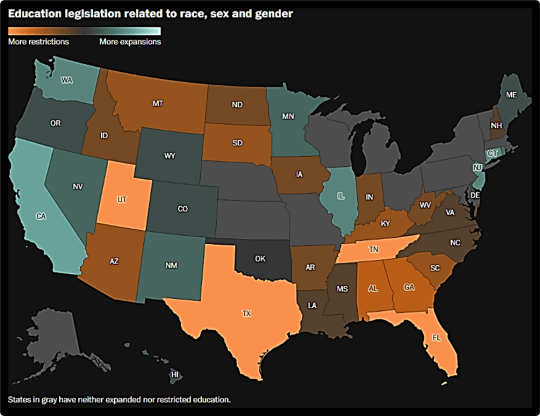

This is an excellent article in The Washington Post about how our school systems have begun to reflect the political divisions in our nation, with many red states legally banning discussions on racism, sexism, and gender issues, and many blue states legally requiring those kinds of discussions. This is a gift🎁link, so anyone can read the entire article, even if the don't subscribe to the Post. Below are some excerpts:
Three-fourths of the nation’s school-aged students are now educated under state-level measures that either require more teaching on issues like race, racism, history, sex and gender, or which sharply limit or fully forbid such lessons, according to a sweeping Post review of thousands of state laws, gubernatorial directives and state school board policies. The restrictive laws alone affect almost half of all Americans aged 5 to 19.
[...]
The divide is sharply partisan. The vast majority of restrictive laws and policies, close to 9o percent, were enacted in states that voted for Donald Trump in the 2020 presidential election, The Post found. Meanwhile, almost 80 percent of expansive laws and policies were enacted in states that voted for Joe Biden in 2020.

The explosion of laws regulating school curriculums is unprecedented in U.S. history for its volume and scope, said Jonathan Zimmerman, a University of Pennsylvania professor who studies education history and policy...states have never before stepped in so aggressively to set rules for local schools.
[...]
[A] nationally representative study from the Rand Corp. released this year found that 65 percent of K-12 teachers report they are limiting instruction on “political and social issues.”
“What the laws show is that we have extremely significant differences over how we imagine America,” Zimmerman said.
[...]
In practice, these divisions mean that what a child learns about, say, the role slavery played in the nation’s founding — or the possibility of a person identifying as nonbinary — may come to depend on whether they live in a red or blue state.
[...]
Almost 40 percent of these laws work by granting parents greater control of the curriculum — stipulating that they must be able to review, object to or remove lesson material, as well as opt out of instruction.
[...]
Another almost 40 percent of the laws forbid schools from teaching a long list of often-vague concepts related to race, sex or gender.

[...] At the college level, among the measures passed in recent years is a 2021 Oklahoma law that prohibits institutions of higher education from holding “mandatory gender or sexual diversity training or counseling,” as well as any “orientation or requirement that presents any form of race or sex stereotyping.”
By contrast, a 2023 California measure says state community college faculty must employ “teaching, learning and professional practices” that reflect “anti-racist principles.”
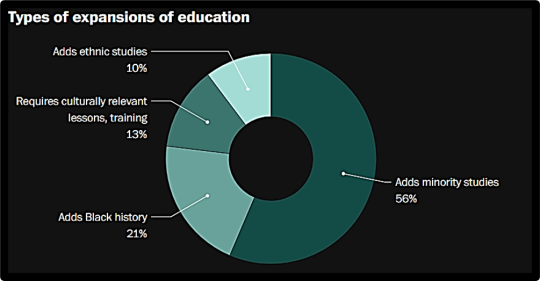
Some experts predicted the politically divergent instruction will lead to a more divided society.
“When children are being taught very different stories of what America is, that will lead to adults who have a harder time talking to each other,” said Rachel Rosenberg, a Hartwick College assistant professor of education.
#us education#political division#red states#blue states#censorship#racism#sexism#gender issues#the washington post#gift link
62 notes
·
View notes
Text
palestinian poets: tariq luthun
tariq luthun is a detroit-born, dearborn-raised community organizer, data consultant, and emmy award-winning poet. the son of palestinian muslim immigrants from gaza, he is a kresge arts in detroit fellow that earned his MFA from the program for writers at warren wilson college. he has been recognized as a best of the net poet and has earned fellowships from kundiman, the watering hole, and the kresge foundation. his work has appeared in vinyl poetry, lit hub, mizna, winter tangerine, and button poetry, among others. luthun currently serves as a board member of the offing literary magazine. his first collection of poetry, How the Water Holds Me, was published by bull city press in 2020. the press named the book an editors' selection.
luthun spends most of his time hosting events, working with youth, and facilitating marginalized communities for growth through expression and action. he is a deep dish pizza evangelist, and can best be described as the end-result of a less problematic drake falsetto-rapping edward said's orientalism.
luthun was also recently interviewed by national public radio about the current escalation in genocidal violence by israel against palestine. as of ten days ago, his family in gaza was all okay.
IF YOU READ JUST ONE POEM BY TARIQ LUTHUN, MAKE IT THIS ONE
OTHER POEMS ONLINE THAT I LOVE BY TARIQ LUTHUN
We Already Know This at literary hub
Al-Bahr at tariq's website
Portrait of My Father Drowning, originally published at crab orchard review
Fruit at up the staircase
Dance at winter tangerine
The Summer My Cousin Went Missing (read aloud) at tariq's website
Whisp at the offing
Mismarked (live performance) recorded by button poetry
Museums at voicemail poems
New Rule at the offing
85 notes
·
View notes
Text
White Widow #1 by Sarah Gailey review.
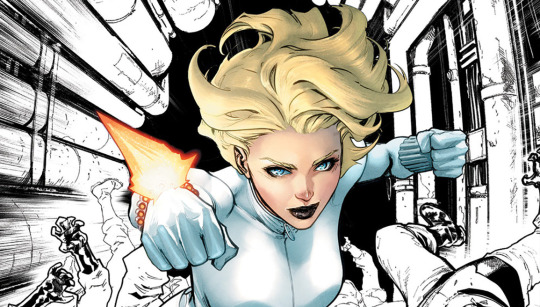
We can all agree that we all fell in love with Florence Pugh’s Yelena Belova in Black Widow (2021) and for many people, including me, she was our first introduction to the character. And as an absolute, completely sane and normal person, I said to myself “Why not read all of her appearances in the comics ?”, and I did.
Surprisingly, both characters are incredibly different. Nonetheless, both interesting and amazing on their own. While I agree that MCU Yelena has more depth and perhaps, more personality, comics Yelena is still a good character. The way she has been written has been very disturbing, even sick and twisted sometimes, like Pale Little Spider (2002) or Black Widow (2001). Sometimes messy, and I suggest everybody forget her Adaptoid phase or anything that ever happened in Secret Avengers (2013) for her sake. But still, you don't erase almost 25 years of a character's development, even if it has been inconsistent, just because you felt like it.
In the comics, Yelena has always been in Natasha’s shadow and has never had her own original story. In Widowmakers: Red Guardians and Yelena Belova (2020) and Winter Guard (2021), we had a glimpse of hope to finally see her character evolve despite Red Guardian’s appearance, a character linked to Natasha. When a limited-serie on White Widow, a character that hasn’t been properly developed and deserved to, was announced, I fucking cheered man. But then I remembered the curse of a character’s MCUfication, because Marvel never does anything right. And oh boy was I not prepared for what was coming…
I don’t even know where to begin. It all felt like a giant fanfiction written by someone who has only ever seen the movie and didn’t even bother to check on other writers’ previous work on Yelena’s character.

White Widow (2023) #1.
There are lots of things wrong in this picture. First and second panel, where does the needle come from ? After I checked and double checked just in case, there were NO records of Yelena being abducted or forced to do anything she has done in her life. She chose to join the Red Room. She chose to be a Black Widow and she was determined to outperform Natasha’s results during tests. She even had a whole mental breakdown about it.

Pale Little Spider (2002) #1
Now, let’s try to find excuses for the use of the needle… The first one would be the Red Room using the Black Widow’s serum they used on the 28th original Widows, during Natasha’s era. But our good ol' Grigor Ivanovich just ruined this theory.

Black Widow (2004) #4
Excuse number two, the Red Room used some sort of a mind-control serum which wouldn’t make any sense too for all of the reasons I said above.
Now the third panel… I’m at a loss for words. Where the fuck does it comes from. Where the FUCK was it during Secret Empire (2017) ? Yelena wasn’t even there anymore, bitch was dead. We didn’t see her until Tales of Suspense: Hawkeye and The Winter Soldier (2018), until she was brought back to life WITH Natasha. Also, she has a real family and they’re even mentioned in Black Widow (2001), Yelena calls her mother and her aunt Olga is mentioned.

White Widow (2023) #1
Now, the board... It looks like it has been made for a MCU tie-in more than anything.
Although I'd like to adress one thing that has been said on Twitter, about the "Hate nationalism → Imperialist invasion". There is a difference between nationalism and patriotism. Being a nationalist is being way too extreme about your country when being a patriot is to love your country, its people and its culture while also being critical about the way its being led.
Now, we know when she was young, Yelena was kind of extreme. In Black Widow: The Things They Say About Her (2005) #1, she admitted she was willing to sacrifice herself for the Motherland more than once. During her Black Widow era, she was naive and had a blind love for Russia which was her biggest weakness.
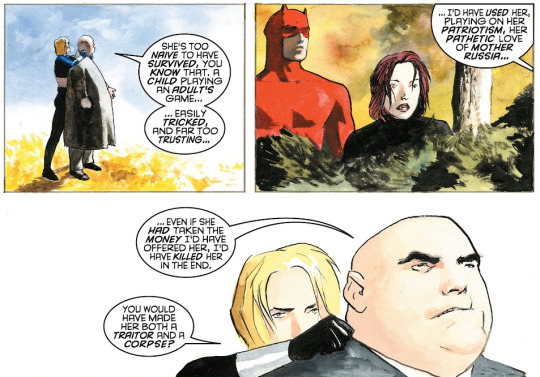
Black Widow (2001) #3
But as her character continued to evolve and grow through her appearences, Yelena is far more reasonable now. She considers herself like a true patriot and she has always been proud of being Russian. In conclusion, this board's section is not as bad as people make it out to be since Yelena went from being an extreme nationalist to a patriot.

Widowmakers: Red Guardian and Yelena Belova (2020)
I know many of you like Kate Bishop and Yelena’s friendship due to their duo in Hawkeye, I too, am a big fan of them… But unfortunately, they only interacted once in the comics. And they didn’t even talk to each other. That’s why mentioning Kate Bishop in her like section is purely fan service and although it is a nice nod to the series, it doesn’t make any sense here. Yelena has interacted with Clint Barton way more than the better Hawkeye, which is sad.

Black Widow (2020) #10
I'd like to come back in the hate section just a second to say I don't know why she hates the Infinity Gauntlet so much that's it's written in caps. It's 100% a nod to the MCU again but here it also doesn't make sense. But again, a lot of things doesn't in this issue.
I wont bother talking about her attitude and how she looks like a teenager swallowing vodka directly from a bottle when she used to be classy and extra with manners. I wont bother talking about her new suit's design which sucks more than her previous one. This is not the Yelena Belova we used to know, it's a complete new character made to match her MCU self and please a small public who mostly watch the movies/series.
I saw a lot of people celebrating Yelena's changes to match Yelena's Florence Pugh more. I know the character has become more famous because of Flo', but this is actually terrible and wasn't handled correctly.
We hoped for a more mature story, maybe a little darker than usual. A new start for her character, to follow her path in making the world a better place and get out of Natasha’s shadow for good. With a little backstory too, nothing much. The bare minimum. Instead, we had a copycat of her MCU counterpart and it is just heartbreaking to see a character I loved so much being destroyed like that.
I could go on and on about why this piece of junk is just a bunch of nonsense and laziness and how Sarah Gailey’s just went for the easiest writing ever… But I will stop there. I just hope she knows that us, fan of comics Yelena, are fucking disappointed. Everything that made her character so special and dear to us, disappeared in one issue. The damage is surreal.
It’s only four issues long so I will continue to read it until the end, but I expect nothing from it anymore. I hope the writer won’t destroy Yelena’s character any further, because things can only go downhill from here.
27 notes
·
View notes
Text
Birds in North America will be renamed to avoid any 'harmful' historical associations with people | AP News
By CHRISTINA LARSON, Updated 7:10 PM EDT, November 1, 2023
Birds in North America will no longer be named after people, the American Ornithological Society announced Wednesday.
Next year, the organization will begin to rename around 80 species found in the U.S. and Canada.
“There is power in a name, and some English bird names have associations with the past that continue to be exclusionary and harmful today,” the organization’s president, Colleen Handel, said in a statement. “Everyone who loves and cares about birds should be able to enjoy and study them freely.”
Rather than review each bird named after a person individually, all such birds will be renamed, the organization announced.
Birds that will be renamed include those currently called Wilson’s warbler and Wilson’s snipe, both named after the 19th century naturalist Alexander Wilson. Audubon’s shearwater, a seabird named for John James Audubon, also will get a new name.
In 2020, the organization renamed a bird once referring to a Confederate Army general, John P. McCown, as the thick-billed longspur.
“I’m really happy and excited about the announcement,” said Emily Williams, an ornithologist at Georgetown University who was not involved in the decision.
She said heated discussions over bird names have been happening within birdwatching communities for the past several years.
“Naming birds based on habitat or appearance is one of the least problematic approaches,” she said.
Earlier this year, the National Audubon Society announced that it would retain its name, even as critics and some voices within the organization have argued that it should dump the association with a man, John James Audubon, whose family owned slaves.
“The name has come to represent so much more than the work of one person,” Susan Bell, chair of the National Audubon Society’s Board of Directors, told Audubon magazine in March, adding, “We must reckon with the racist legacy of John James Audubon.”
A 2020 encounter in New York’s Central Park served as a public wake-up call about the discrimination that Black people sometimes face when trying to enjoy the outdoors.
Christian Cooper, a Black birdwatcher, was looking for birds when he asked a white woman, Amy Cooper, to follow local rules and leash her dog. Cooper called 911 and was later charged with filing a false police report, though the charges were later dropped.
Soon after, a collective of birdwatchers organized the first Black Birders Week to increase the visibility of Black nature lovers and scientists.
And a group called Bird Names for Birds sent a petition to the ornithological society urging it to “outline a plan to change harmful common names” of birds.
21 notes
·
View notes
Text


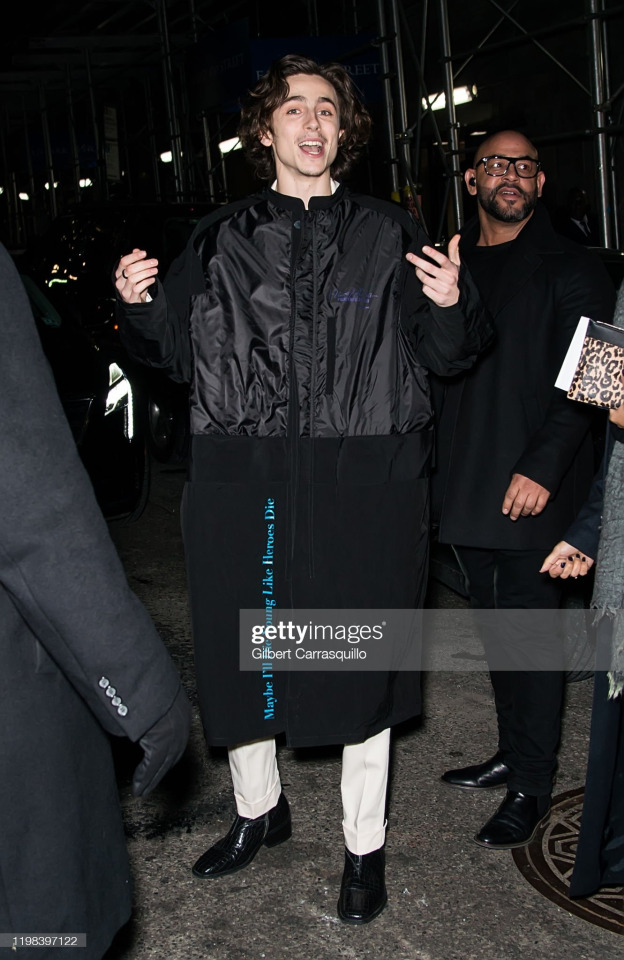

Timothée Chalamet seen leaving the 2020 National Board Of Review on 8 January 2020. Photographed by Gilbert Carrasquillo
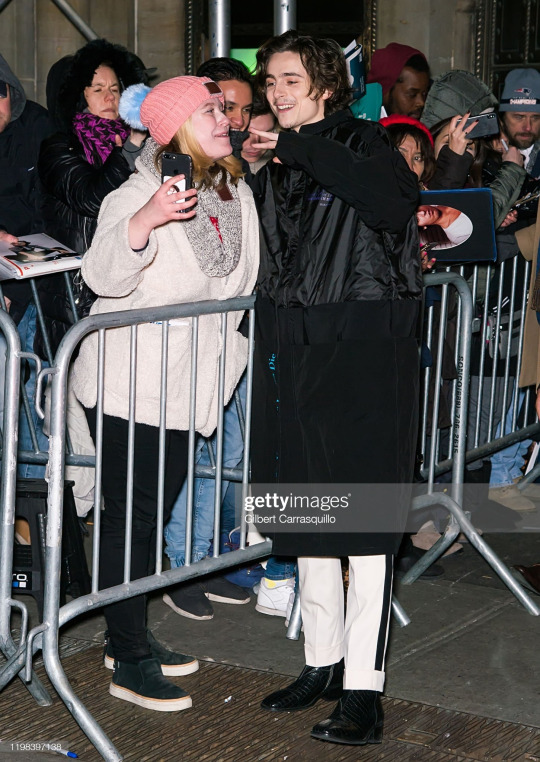

48 notes
·
View notes
Text
Harvard’s chief diversity and inclusion officer has become the latest member of staff to be accused of plagiarism, including a failure to properly cite her own husband’s study.
An anonymous complaint has listed at least 40 examples of alleged plagiarism by Sherri Ann Charleston dating from 2009, a decade before she joined Harvard, the Washington Free Beacon reported.
The allegations, which include failing to properly cite other academics’ work and lifting portions of text without quotation marks, come just weeks after Claudine Gay, Harvard University’s former president, resigned in the wake of a plagiarism scandal.
According to the Beacon, Dr Charleston, who is a historian, submitted a 2009 dissertation to the University of Michigan which included quotes or paraphrases from nearly a dozen scholars without proper attribution.
The complaint also alleges Dr Charleston ultimately took credit for a study that her husband, LaVar Charleston, wrote in 2012. He is now the University of Wisconsin-Madison’s deputy vice chancellor for diversity and inclusion.
That alleged act of plagiarism involved Dr Charleston recycling large portions of her husband’s earlier paper in a peer-reviewed article that she co-wrote in 2014, according to the complaint.
The article, published in the Journal of Negro Education, reportedly had the same findings, method and survey subject descriptions from her husband’s original work.
“The 2014 paper appears to be entirely counterfeit,” Peter Wood, the head of the National Association of Scholars and a former associate provost at Boston University, told the Beacon. “This is research fraud pure and simple.”
Steve McGuire, a former political theory professor at Villanova University, reviewed both the 2012 and 2014 papers.
“Sherri Charleston appears to have used somebody else’s research without proper attribution,” he told the Beacon.
The full complaint has been reportedly filed with Harvard, the University of Michigan and the University of Wisconsin-Madison. Neither Dr Charleston nor her husband have commented on the allegations.
Dr Charleston was the chief affirmative action officer at the University of Wisconsin-Madison before switching to Harvard in August 2020, becoming its first chief diversity officer.
According to the Harvard Crimson, she was involved in the university’s presidential search process that resulted in the selection of Dr Gay in December 2022.
Dr Gay resigned on Jan 2 after facing allegations of plagiarism as well as criticism for her comments about anti-Semitism on campus.
Harvard’s board investigated the plagiarism complaints against the president in December and found “a few instances of inadequate citation” but “no violation of Harvard’s standard for research misconduct”.
#nunyas news#academics are now living in fear#well the ones that cheated are at least I hope#which is goood
8 notes
·
View notes
Text
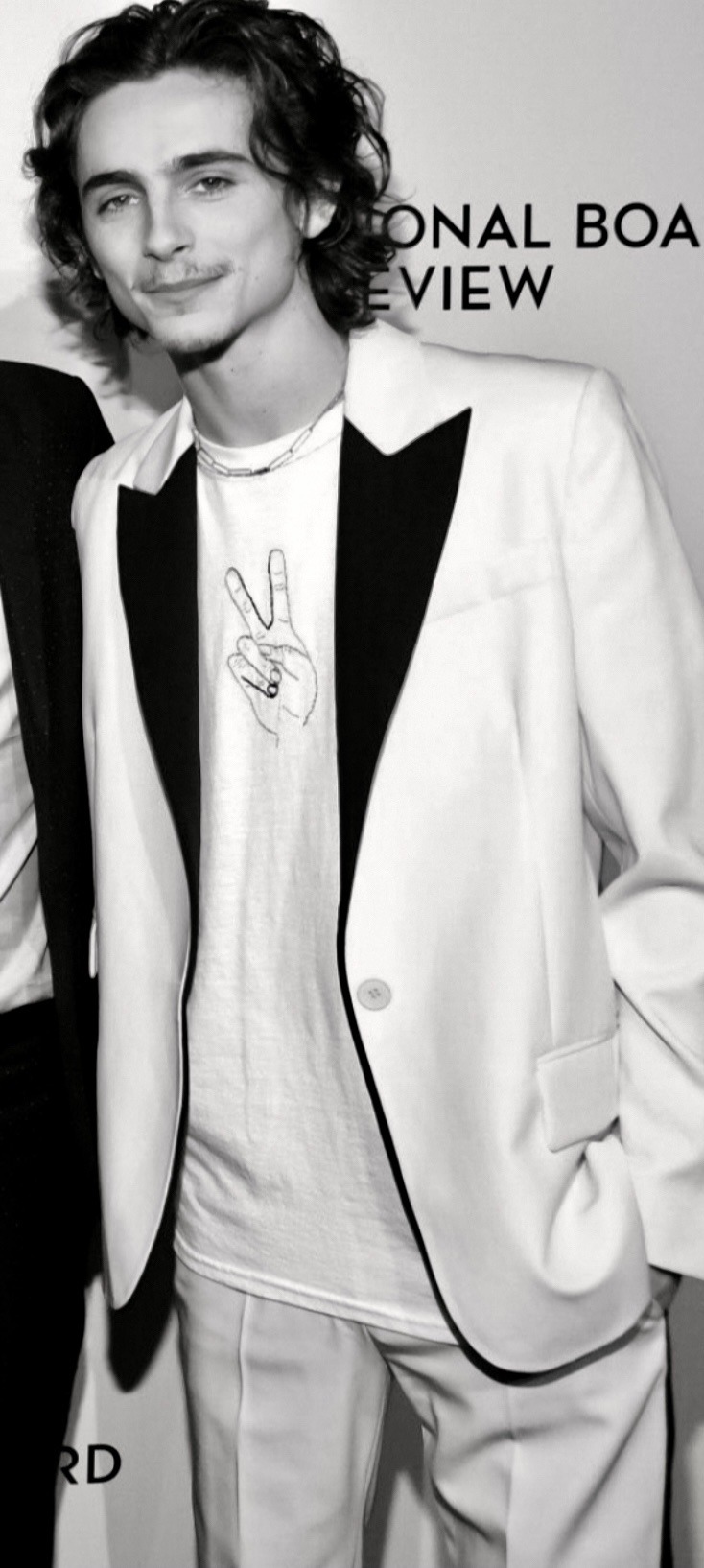

NATIONAL BOARD OF REVIEW-JANUARY 8, 2020
#timothee chalamet#national board of review gala#national board of review#timothée chalamet#january 8
63 notes
·
View notes
Text
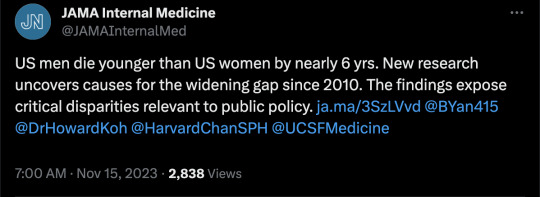
By: Brandon W. Yan, MD, MPH1,2; Elizabeth Arias, PhD3; Alan C. Geller, MPH, RN2; et al
Published: Nov 13, 2023
As life expectancy at birth in the US decreased for the second consecutive year, from 78.8 years (2019) to 77.0 years (2020) and 76.1 years (2021), the gap between women and men widened to 5.8 years, its largest since 1996 and an increase from a low of 4.8 years in 2010.1,2 For more than a century, US women have outlived US men, attributable to lower cardiovascular and lung cancer death rates related largely to differences in smoking behavior.1,2 This study systematically examines the contributions of COVID-19 and other underlying causes of death to the widened gender life expectancy gap from 2010 to 2021.
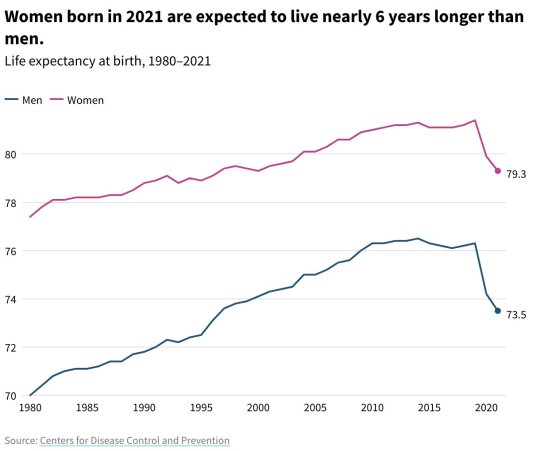
Methods
Analyses were performed from March to July 2023 using Stata, version 17.0 (StataCorp LLC) and Office Excel (Microsoft). Using mortality data from the National Center for Health Statistics, this cross-sectional study examines the association of changes in cause-specific mortality with changes in the gap in life expectancy at birth between men and women from 2010 to 2021, divided by pre– and post–COVID-19 years. We used a decomposition technique to partition changes in the life expectancy gap between men and women into component additive parts that identify the causes of death having the greatest assocation, positive or negative, with changes in life expectancy.3 Cause of death categories are based on the International Statistical Classification of Diseases and Related Health Problems, Tenth Revision. For further specificity, we partitioned changes in unintentional injuries into select components (unintentional poisoning [mostly drug overdose], unintentional transport-related injuries, and all other injuries). We estimated the differences between men and women in the age-adjusted death rates for the top causes of death associated with changes in the life expectancy gender gap. This study was exempt from review from the Harvard Longwood Campus institutional review board, and informed consent was not required because this study used deidentified data. This study followed the STROBE reporting guideline.
Results
The gender life expectancy gap increased 0.23 years from 2010 to 2019 and 0.70 years from 2019 to 2021. Prior to COVID-19 in 2020, the largest contributors to worsening life expectancy for men vs women were unintentional injuries (−0.23 years [−0.23246/−0.5116 = 45.4%]), diabetes (−0.05 years [10.1%]), suicide (−0.04 years [7.8%]), homicide (−0.03 years [5.3%]), and heart disease (−0.03 years [4.9%]) (Figure, A). This was offset by differential improvement for men vs women in mortality from cancer (0.12 years [43.1%]), Alzheimer disease (0.06 years [20.5%]), and chronic lower respiratory disease (0.04 years [12.3%]), among others.
From 2019 to 2021, COVID-19 became the leading contributor to the widening gender life expectancy gap (−0.33 years [39.8%]) followed by unintentional injuries (−0.27 years [32.5%]) (Figure, B). The increasing maternal deaths among women and the relative reductions in cancer and perinatal conditions among men partially mitigated the increasing gap (Figure, B). From 2010 to 2021, unintentional poisonings (mostly drug overdoses) and unintentional transport-related injuries contributed 0.44 (86.3%) and 0.06 (11.8%) of the 0.51-year decrease in life expectancy from unintentional injuries. The absolute difference in age-adjusted death rates between men and women increased from 252 to 315 per 100 000 between 2010 and 2021, with a persistent gap for heart disease and widening gaps for COVID-19, unintentional injuries, and several other causes (Table).

Discussion
This analysis finds that COVID-19 and the drug-overdose epidemic were major contributors to the widening gender gap in life expectancy in recent years. Men experienced higher COVID-19 death rates for likely multifactorial reasons, including higher burden of comorbidities and differences in health behaviors and socioeconomic factors, such as labor force participation, incarceration, and homelessness.4,5 Differentially worsening mortality from diabetes, heart disease, homicide, and suicide suggest that chronic metabolic disease and mental illness may also contribute. The increase in overdose deaths, homicide, and suicide underscore twin crises of deaths from despair and firearm violence.6 Limitations include binary gender classification and unexplored heterogeneity within disease classifications and across geographic and demographic subgroups. Future analyses could explore whether these trends changed after 2021, especially as the pandemic recedes, with further detail on specific causes.
==
Look at that COVID differential. Nobody talked about how the two greatest contributing factors to COVID death where obesity and being male.
Life is the greatest privilege of all.
Followed by the privilege of anyone caring about your wellbeing.
#men's health#life expectancy#suicide#COVID#drug overdose#heart disease#gender gap#female privilege#health#homelessness#homeless men#homeless#science#religion is a mental illness
9 notes
·
View notes
Photo

ODNI Releases 25th and 26th Joint Assessments of FISA Section 702 Compliance
September 29, 2023
In accordance with the Principles of Intelligence Transparency for the Intelligence Community, the Office of the Director of National Intelligence (ODNI), in consultation with the Department of Justice (DOJ), is making publicly available, with redactions, the 25th and 26th Semiannual Assessments of Compliance with Procedures and Guidelines Issued Pursuant to Section 702 of the Foreign Intelligence Surveillance Act (“Joint Assessments”) submitted by the Attorney General and the Director of National Intelligence (DNI). These Joint Assessments cover the periods of 1 June 2020 through 31 May 2021.
About the Joint Assessments
Section 702(m) of the Foreign Intelligence Surveillance Act of 1978, as amended, requires the Attorney General and the DNI to assess the Government’s compliance with the Section 702 targeting, minimization, and querying procedures, as well as the Attorney General’s Section 702 Acquisition Guidelines, at least once every six months. A joint team of experts from the DOJ National Security Division and ODNI conduct regular assessments to review compliance and evaluate how agencies that receive unminimized Section 702 collection implement the authority.
DOJ and ODNI submit their assessments to the Foreign Intelligence Surveillance Court (FISC), relevant congressional committees, and the Privacy and Civil Liberties Oversight Board semi-annually through the Joint Assessments. The Joint Assessments describe how those agencies that receive unminimized information acquired under Section 702—the National Security Agency (NSA), Federal Bureau of Investigation (FBI), Central Intelligence Agency (CIA), and National Counterterrorism Center (NCTC)—implement their authority under Section 702, including agencies’ internal compliance efforts, training efforts, and responsive actions to prevent recurrence of compliance issues. The Joint Assessments also include metrics and narratives describing the Government’s compliance with Attorney General Guidelines and with FISC-approved targeting, minimization, and querying procedures.
Key Findings of the 25th and 26th Joint Assessments
DOJ and ODNI assessed that NSA, FBI, CIA, and NCTC continued to implement the Section 702 procedures and follow the relevant guidelines in a manner that generally reflects a focused and concerted effort by agency personnel to comply with the requirements of Section 702.
Due to the effects of the coronavirus pandemic, DOJ and ODNI note that caution is warranted when drawing conclusions regarding some of the compliance trends from the 25th and 26th Joint Assessments. While the total number of reported compliance incidents decreased significantly, the joint oversight team was not able to determine to what extent the decrease reflects changes in the number of compliance incidents that occurred—whether as a result of the coronavirus pandemic or other factors—as opposed to difficulties in discovering and reporting compliance incidents as a result of the pandemic. For example, while the number of NSA targeting compliance incidents fell sharply, most of the NSA targeting decisions covered by the 25th and 26th Joint Assessments occurred during the pandemic. If a Section 702 target travels to the United States, NSA must detask—or stop collection on—that target while the target is in the United States. Reduced travel during the pandemic likely resulted in fewer Section 702 targets traveling to the United States, thus reducing the likelihood that detasking delays would occur as a result of such travel.
Similarly, while the number of FBI querying incidents reported in the 25th and 26th Joint Assessments was significantly lower than pre-pandemic, the decline may be attributable to difficulties in discovering and reporting querying compliance incidents. FBI field office reviews have been responsible for discovering a significant portion of FBI querying incidents. DOJ suspended its reviews at FBI field offices for eight of the 12 months covered by the 25th and 26th Joint Assessments and was able to conduct only four query audits of FBI field offices during this time. By contrast, DOJ conducted query audits of 27 FBI field offices in 2019 and 29 FBI field offices in 2018.
Additionally, the FBI querying compliance incidents discussed in these Joint Assessments occurred prior to the corrective measures FBI implemented in mid-2021 and 2022. Thus, these Joint Assessments do not reflect the effects of FBI’s corrective measures.
Additional Information
The 25th and 26th Joint Assessments are posted in full-text searchable format on Intel.gov.
25th Joint Assessment (dated April 2022): Reporting Period 01 June 2020 - 30 November 2020
26th Joint Assessment (dated August 2022): Reporting Period 01 December 2020 - 31 May 2021
11 notes
·
View notes
Text
HOW ARE THEY REINSTATING MURDERING COPS IN ATLANTA?
U.S.|Atlanta to Pay $1 Million to Rayshard Brooks’s Family

Nov. 21, 2022, 9:50 p.m. ET
The city of Atlanta agreed on Monday to pay $1 million to settle a lawsuit brought by the widow and the estate of Rayshard Brooks, a Black man who was fatally shot by a white police officer in 2020, and whose death touched off nationwide protests.
The City Council’s unanimous vote came nearly three months after prosecutors determined that the two officers involved in the episode committed no crimes on June 12, 2020, when Mr. Brooks, 27, was shot by one of the officers in a Wendy’s parking lot. The Council also found that the use of deadly force had been reasonable.
Lawyers for Mr. Brooks’s family, from the firm Stewart Miller Simmons Trial Attorneys, said in a statement that “although the children of Mr. Brooks have lost their father, settling the case will undoubtedly assist them with future plans as they come of age.”
They added that the family was “disappointed that prosecutors didn’t pursue a criminal case against the officers involved in Mr. Brooks’s death.”
Councilman Dustin Hillis said at a Council meeting on Monday that the settlement would be paid to Mr. Brooks’s widow, Tomika Miller; the Brooks estate; and the lawyers’ firm.
He added that the city attorney had determined that “the city of Atlanta’s potential financial exposure in defending plaintiff’s claims is in excess of the settlement amount.”
The family’s wrongful-death lawsuit had claimed that the killing of Mr. Brooks was “senseless and unjustified,” and that the city had violated his civil rights.
Mr. Brooks was killed about three weeks after a police officer in Minneapolis murdered George Floyd. The Atlanta killing spurred fresh rounds of street demonstrations in 2020 and became part of the broader national debate about the treatment of Black Americans at the hands of police officers.
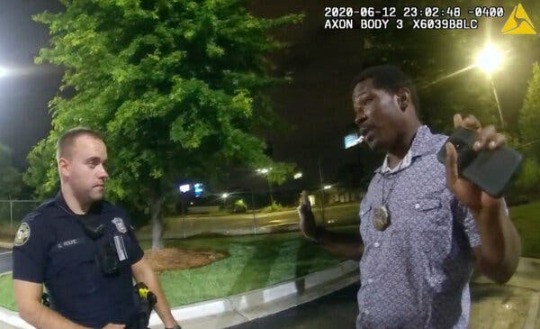
The authorities said that Mr. Brooks had fallen asleep in his car in the drive-through lane at Wendy’s on June 12, 2020. At first, the encounter between the officers and Mr. Brooks was calm. But after 40 minutes, the episode turned violent when the officers moved to arrest him. Mr. Brooks hit one of the officers, grabbed the other’s Taser, fired it and took off running.
A widely shared video captured the moment when one of the officers, Garrett Rolfe, who had worked with the department since 2013, fired his handgun three times while he was chasing Mr. Brooks, who fired the Taser he had seized as he ran.
Mr. Brooks was shot twice, in the back and buttocks, prosecutors said. He was taken to a hospital, where he died after surgery, the authorities said.
In the wake of the shooting, the Wendy’s restaurant where the shooting occurred was burned down after angry demonstrations, and the Atlanta police chief at the time, Erika Shields, resigned.
Officer Rolfe was initially charged with murder and 10 other criminal counts in connection with the fatal shooting of Mr. Brooks, and the other officer, Devin Brosnan, faced a number of lesser charges. But prosecutors announced in August that they would drop all charges.
Officer Rolfe was fired from the Police Department the day after the shooting, but reinstated in May 2021 by the city’s Civil Service Review Board.
#Atlanta to Pay $1 Million to Rayshard Brooks’s Family#Rayshard Brooks#apd#murdered by atlanta cops at wendys#HOW ARE THEY REINSTATING MURDERING COPS IN ATLANTA?#Black Lives Matter#BLM
59 notes
·
View notes
Text
Nobody does class solidarity like the rich. In May 2020, Baroness Dido Harding, a Conservative peer and wife of Conservative MP John Penrose, was appointed to lead the UK’s privatised Coronavirus Test and Trace system, a programme later described by doctors as ‘an utter shambles’. Four months later, she was made interim chief of the National Institute for Health Protection, a body designed by management consulting firm McKinsey to replace Public Health England. The National Institute for Health Protection is overseen by a board including executives from the likes of Waitrose, Jaguar and TalkTalk – the latter of which Harding was previously chief executive, overseeing a period in which over 150,000 customers found their personal data stolen in a data breach.
Harding had never been through a standard recruitment process when she was appointed by the government. Nor had Topshop boss Sir Philip Green when he was selected as David Cameron’s efficiency tsar in 2010, or venture capitalist Adrian Beecroft when he was commissioned in 2012 to provide a review of employment law, in which he suggested that workers might like to trade in their rights for business shares. Nor, for that matter, had Matthew Taylor (CBE) of the Taylor Review. Property developer Richard Desmond also faced no such inconvenience in 2020 when he was allegedly able to influence planning decisions by being rich enough to make a £12,000 donation to the Tory party. No amount of incompetence or negligence is a match for solidarity within the upper echelons of power. Money and influence speak louder than science, evidence, compassion or common sense.
Eve Livingston, Make Bosses Pay: Why We Need Unions
60 notes
·
View notes
Text

The Fabelmans (2022, Steven Spielberg)
17/03/2024
The Fabelmans is a 2022 American film directed by Steven Spielberg.
The film is a semi-autobiographical story loosely based on Spielberg's adolescence and early years as a director. The plot is told through the original story of the fictional Sammy Fabelman, a young aspiring filmmaker who explores how the power of film can help him see the truth about his dysfunctional family and those around him. It stars Gabriel LaBelle in the role of Sammy, alongside Michelle Williams, Paul Dano, Seth Rogen and Judd Hirsch in supporting roles. The film is dedicated to the memories of Spielberg's real-life parents, Leah Adler and Arnold Spielberg, who died in 2017 and 2020, respectively.
Spielberg had conceived the project as early as 1999, with his sister Anne writing a screenplay titled I'll Be Home. Spielberg revisited the project in 2019 with screenwriter and frequent collaborator Kushner while they were making West Side Story, and the script was completed in late 2020.
It premiered at the Toronto International Film Festival on September 10, 2022, where it won the People's Choice Award. Distributed by Universal Pictures, the film opened theatrically in the United States on November 11, 2022, and then expanded to wide release on November 23, grossing $45.6 million against a $40 million budget, a disappointing result for a film directed and produced by Spielberg. It received largely positive reviews from critics and was named one of the ten best films of 2022 by the National Board of Review and the American Film Institute. The Fabelmans earned numerous awards and nominations, including seven nominations at the 95th Academy Awards, including seven nominations at the 95th Academy Awards, including Best Picture, Best Director, Best Actress (Williams) and Best Supporting Actor (Hirsch). It also earned 11 nominations at the 28th Critics' Choice Awards, winning Best Young Performer (LaBelle), and five nominations at the 80th Golden Globe Awards, winning Best Motion Picture - Drama and Best Director.
#the fabelmans#film#united states#2022#steven spielberg#Autobiographical novel#Sammy Fabelman#gabriel labelle#michelle williams#paul dano#seth rogen#judd hirsch#Arnold Spielberg#Anne Spielberg#west side story#2022 Toronto International Film Festival#Toronto International Film Festival People's Choice Award#universal pictures#Limited theatrical release#national board of review#American Film Institute#List of accolades received by The Fabelmans#95th Academy Awards#Academy Award for Best Picture#Academy Award for Best Director#Academy Award for Best Actress#Academy Award for Best Supporting Actor#28th Critics' Choice Awards#Critics' Choice Movie Award for Best Young Performer#80th Golden Globe Awards
2 notes
·
View notes
Text
One of Canada's intelligence watchdogs has scolded the country's cyber security agency over its approach to international law.
The National Security and Intelligence Review Agency reviewed the Communications Security Establishment's activities in 2019, the first year after it received new powers. While the review was completed in 2020, its report was made public only this week.
The CSE insists it never violated international law and is calling the matter a "philosophical" disagreement with its oversight body.
"CSE, because we are the ones who deal with foreign cyber operations, did not violate international law. We did not even come close to violating international law," Nabih Eldebs, CSE deputy chief of authorities, compliance and transparency, told CBC News. [...]
Continue Reading.
Tagging: @politicsofcanada
13 notes
·
View notes
Text

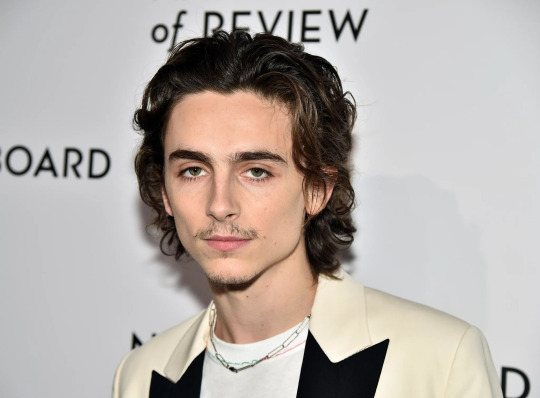
Timothee Chalamet at the National Board of Review
Jan 2018 & Jan 2020
17 notes
·
View notes
Text
Over the summer, a political action committee (PAC) supporting Florida governor and presidential hopeful Ron DeSantis uploaded a video of former president Donald Trump on YouTube in which he appeared to attack Iowa governor Kim Reynolds. It wasn’t exactly real—though the text was taken from one of Trump’s tweets, the voice used in the ad was AI-generated. The video was subsequently removed, but it has spurred questions about the role generative AI will play in the 2024 elections in the US and around the world.
While platforms and politicians are focusing on deepfakes—AI-generated content that might depict a real person saying something they didn’t or an entirely fake person—experts told WIRED there's a lot more at stake. Long before generative AI became widely available, people were making “cheapfakes” or “shallowfakes.” It can be as simple as mislabeling images, videos, or audio clips to imply they’re from a different time or location, or editing a piece of media to make it look like something happened that didn’t. This content can still have a profound impact if they’re allowed to circulate on social platforms. As more than 50 countries prepare for national elections in 2024, mis- and disinformation are still powerful tools for shaping public perception and political narratives.
Meta and YouTube have both responded in recent months with new policies around the use of generative AI in political ads like the one in support of DeSantis. Last month, Meta announced that it would require political advertisers to disclose whether an ad uses generative AI, joining Google, which owns YouTube, in responding to concerns that newly available tools could be used to mislead voters. In a note on its blog post about how the company is approaching the upcoming 2024 elections, Meta says that it will require advertisers “to disclose when they use AI or other digital techniques to create or alter a political or social issue ad in certain cases.”
“The scope is only political ads, which is a tiny part of the political ecology where people are increasingly using AI-generated media,” says Sam Gregory, program director at the nonprofit Witness, which helps people use technology to promote human rights. “It's not clear that it covers the broad range of shallowfakes or cheapfake approaches that are already being deployed both in political ads, but also, of course, in much broader ways that people use in political context.”
And not all misleading political content ends up in advertisements. For instance, in 2020, a video went viral that made it appear like Representative Nancy Pelosi was slurring her speech. The video itself wasn’t fake, but it had been slowed down to make Pelosi appear drunk. Though Twitter, TikTok, and YouTube removed the video, it remained live on Facebook, with a label noting it was “partly false.” The video itself wasn’t an ad, though it was clearly targeting a political figure.
Earlier this year, Meta’s Oversight Board took on a case reviewing doctored video of President Joe Biden, which had not been generated or edited using AI, and which the company left up on the platform. The board will use the case to further review the company’s “manipulated media policy,” which stipulates that videos where “a subject … said words that they did not say” and which are “the product of artificial intelligence or machine learning” will be removed. Content like the Pelosi and Biden videos don't clearly violate this policy. Manipulated audio, particularly problematic in many non-English contexts, is nearly completely left out.
“Political ads are deliberately designed to shape your emotions and influence you. So, the culture of political ads is often to do things that stretch the dimensions of how someone said something, cut a quote that's placed out of context,” says Gregory. “That is essentially, in some ways, like a cheap fake or shallow fake.”
Meta did not respond to a request for comment about how it will be policing manipulated content that falls outside the scope of political advertisements, or how it plans to proactively detect AI usage in political ads.
But companies are only now beginning to address how to handle AI-generated content from regular users. YouTube recently introduced a more robust policy requiring labels on user-generated videos that utilize generative AI. Google spokesperson Michael Aciman told WIRED that in addition to adding “a label to the description panel of a video indicating that some of the content was altered or synthetic,” the company will include a more “more prominent label” for “content about sensitive topics, such as elections.” Aciman also noted that “cheapfakes” and other manipulated media may still be removed if it violates the platform’s other policies around, say, misinformation or hate speech.
“We use a combination of automated systems and human reviewers to enforce our policies at scale,” Aciman told WIRED. “This includes a dedicated team of a thousand people working around the clock and across the globe that monitor our advertising network and help enforce our policies.”
But social platforms have already failed to moderate content effectively in many of the countries that will host national elections next year, points out Hany Farid, a professor at the UC Berkeley School of Information. “I would like for them to explain how they're going to find this content,” he says. “It's one thing to say we have a policy against this, but how are you going to enforce it? Because there is no evidence for the past 20 years that these massive platforms have the ability to do this, let alone in the US, but outside the US.”
Both Meta and YouTube require political advertisers to register with the company, including additional information such as who is purchasing the ad and where they’re based. But these are largely self-reported, meaning some ads can slip through the company’s cracks. In September, WIRED reported that the group PragerU Kids, an extension of the right-wing group PragerU, had been running ads that clearly fell within Meta’s definition of “political or social issues”—the exact kinds of ads for which the company requires additional transparency. But PragerU Kids had not registered as a political advertiser (Meta removed the ads following WIRED’s reporting).
Meta did not respond to a request for comment about what systems it has in place to ensure advertisers properly categorize their ads.
But Farid worries that the overemphasis on AI might distract from the larger issues around disinformation, misinformation, and the erosion of public trust in the information ecosystem, particularly as platforms scale back their teams focused on election integrity.
“If you think deceptive political ads are bad, well, then why do you care how they’re made?” asks Farid. “It’s not that it’s an AI-generated deceptive political ad, it’s that it’s a deceptive political ad period, full stop.”
3 notes
·
View notes
Text
266 - The Nest

We who loved his debut Martha Marcy May Marlene (see previous episode!) waited eagerly for director Sean Durkin's follow-up feature while he worked in television and produced other films. That sophomore feature came almost a decade later with The Nest. Starring Carrie Coon and Jude Law, the film follows a married couple who move to England to follow the husband's finance career, only to quickly get consumed by financial woes. The film also returned Durkin to the Sundance Film Festival... and then the pandemic happened.
This episode, we talk about Durkin's upcoming The Iron Claw and Carrie Coon's work in theatre and on The Leftovers. We also discuss how the film dabbles delicately in psychological horror, Jude Law's playing pathetic men to perfection, and the 2020 Sundance Film Festival lineup.
Topics also include the National Board of Review's Top 10 Independent Films of 2020, Durkin's work on Dead Ringers, and IFC Films.
Links:
The 2020 Academy Awards
The 2020 Sundance Film Festival
Vulture Movies Fantasy League
Subscribe:
Patreon
Spotify
Apple Podcasts
Google Play
#Sean Durkin#Carrie Coon#Jude Law#Anne Reid#Charlie Shotwell#Oona Roche#Michael Culkin#Wendy Crewson#Adele Akhtar#Best Actress#Best Actor#Sundance Film Festival#Academy Awards#Oscars#Gotham Awards#National Board of Review#movies
4 notes
·
View notes